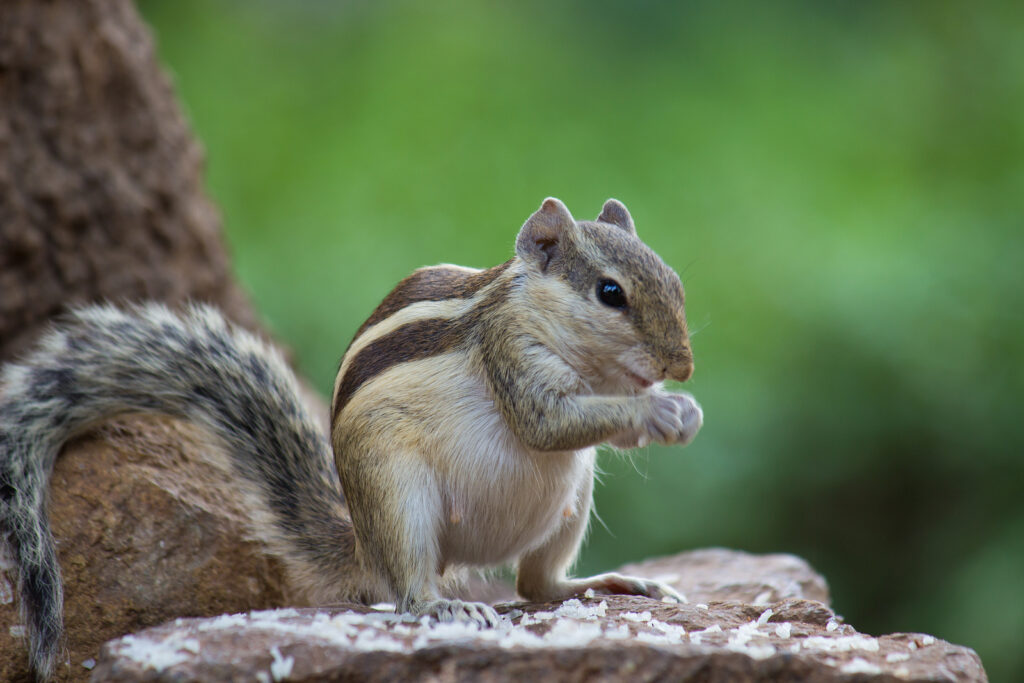Have you noticed small, striped rodents scurrying around your yard, digging holes, and nibbling on your garden plants? You’re not alone. Chipmunk infestations are a common problem for many homeowners and gardeners. These tiny creatures, though adorable, can cause significant damage to your property if not managed properly.
In this blog post, we will explore the behavior and habitats of chipmunks, identify signs of an infestation, understand the potential impacts, and provide effective prevention and control methods. By the end, you’ll be equipped with the knowledge to protect your home and garden from these mischievous critters.

Overview of Common Chipmunk Species
There are 25 species of chipmunks, but the ones most often found in residential areas are the Eastern chipmunk and the Least chipmunk. The Eastern chipmunk is the larger of the two, measuring about 5 to 6 inches long (excluding the tail) and sporting a reddish-brown coat with distinctive black and white stripes running down its back. The Least chipmunk is smaller, with a slenderer build and darker stripes. Understanding which species that you are dealing with is the first step in successfully managing an infestation.
Habits, Diet, and Nesting Preferences
Chipmunks are diurnal, meaning they are active during the day. They are omnivorous and have a varied diet that includes seeds, nuts, fruits, berries, and insects. In the wild, they store food in their burrows to prepare for the winter months. These burrows, often located near tree roots or rock piles, can be extensive, with multiple chambers for sleeping, storing food, and rearing young.
However, when chipmunks venture into residential areas, they may create burrows under patios, sidewalks, and even house foundations. Their constant need to forage and store food can lead them into gardens and homes, where they can become a nuisance.
Beneficial and Problematic Roles
While chipmunks play a crucial role in ecosystems by dispersing seeds and aerating soil through their burrowing activities, they can also cause significant problems for homeowners. Their burrowing can damage lawns, gardens, and even structural foundations. Understanding their dual role helps us appreciate their place in nature while recognizing the need for control in residential settings.
Signs of a Chipmunk Infestation
Spotting a chipmunk or two in your yard isn’t necessarily a cause for alarm, but several signs indicate a more serious infestation. Look for:
- Small holes (about the size of a quarter) in your lawn or garden beds.
- Burrow openings near foundations, patios, or walkways.
- Chewed plant stems or bulbs.
- Droppings resembling small, dark pellets.
Distinguishing Chipmunk Activity
It’s essential to differentiate chipmunk activity from other pests like moles, voles, or mice. Chipmunk burrows typically have clean entrances without surrounding dirt mounds, unlike molehills. Observing their activity patterns—daytime for chipmunks versus nocturnal for many other rodents—can also help in identification.
The Impact of Chipmunk Infestations
Damage to Gardens and Structures
Chipmunks’ burrowing can undermine garden walls, patios, and house foundations, leading to structural damage over time. Their digging in flower beds and vegetable gardens can uproot plants and destroy root systems. Additionally, they may chew on garden hoses, irrigation systems, and even electrical wiring, creating hazards and requiring costly repairs.
Health Risks
While chipmunks are generally not aggressive, they can carry diseases like leptospirosis, salmonella, and hantavirus, which can be transmitted to humans through direct contact or indirectly through contaminated water or soil. They may also harbor fleas, ticks, and mites, posing additional health risks to pets and people.
Chipmunk Proofing and Prevention Methods
Landscaping and Yard Maintenance
To make your property less inviting to chipmunks, consider the following tips:
- Keep your lawn mowed and free of debris.
- Trim tree branches and shrubs to reduce cover.
- Use mulch or gravel around plant beds to deter digging.
- Remove food sources like birdseed, fallen fruit, and pet food.
Sealing Entry Points
Inspect your home and garage for potential entry points and seal any gaps or cracks. Use metal mesh or hardware cloth to cover vents, chimneys, and other openings. Ensure that doors and windows close tightly and repair any damaged screens.
Chipmunk Removal and Control
Humanely Deterring Chipmunks
There are several humane methods to deter chipmunks from your property. Motion-activated sprinklers, ultrasonic repellers, and natural repellents like cayenne pepper or garlic spray can be effective. Additionally, planting certain deterrent plants like daffodils, marigolds, or garlic chives can help keep chipmunks at bay.
Common Chipmunk Removal Methods
Live trapping is a popular method for removing chipmunks. Small animal traps are baited with peanut butter, sunflower seeds, or fruit. They are strategically placed near burrow entrances or along known pathways. Once captured, they are relocated far away from your property to prevent their return. Live trapping should only be carried out by licensed wildlife removal operators.
Professional Wildlife Control Services
If you have a severe infestation or prefer not to handle the removal yourself, consider hiring a professional wildlife control service. These experts can assess the situation, implement effective control measures, and provide advice on preventing future infestations.
Conclusion
Chipmunks, while charming, can become problematic when they invade our gardens and homes. By understanding their behavior and habits, recognizing signs of infestation, and implementing effective prevention and control methods, you can protect your property from damage and health risks. Taking proactive measures will help you enjoy a chipmunk-free environment, preserving the beauty and integrity of your garden and home.
Are chipmunks too much of a problem around your home or property? Contact Smoky Wildlife Control at 615-610-0962 for TWRA licensed and insured commercial chipmunk removal and control in Nashville, Tennessee and beyond. We also work with many other types of wildlife, including squirrels, and serve both residential and commercial clients.
Related Posts:
The Ultimate Guide to Chipmunk Removal: Keep Your Yard Safe
How to Get Rid of Chipmunks in Your Yard
How to Keep Chipmunks Out of the Garden

